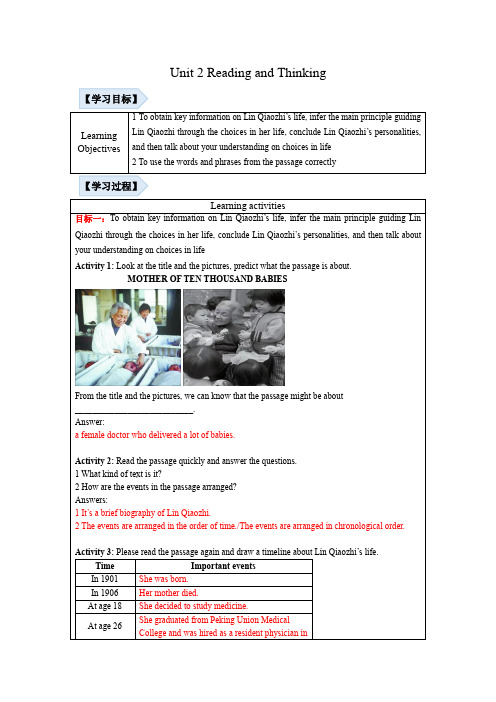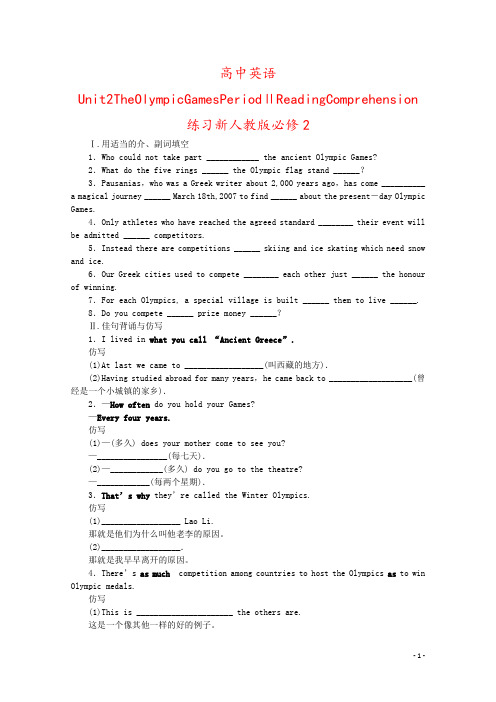Unit 2 Period 2 Reading 2-3
Unit2Period2ReadingandThinking(教师版)

Unit 2 Reading and ThinkingLearning Objectives 1 To obtain key information on Lin Qiaozhi’s life, infer the main principle guiding Lin Qiaozhi through the choices in her life, conclude Lin Qiaozhi’s personalities, and then talk about your understanding on choices in life2 To use the words and phrases from the passage correctlyLearning activities目标一:To obtain key information on Lin Qiaozhi’s life, infer the main principle guiding Lin Qiaozhi through the choices in her life, conclude Lin Qiaozhi’s personalities, and then talk about your understanding on choices in lifeActivity 1: Look at the title and the pictures, predict what the passage is about.MOTHER OF TEN THOUSAND BABIESFrom the title and the pictures, we can know that the passage might be about___________________________.Answer:a female doctor who delivered a lot of babies.Activity 2: Read the passage quickly and answer the questions.1 What kind of text is it?2 How are the events in the passage arranged?Answers:1 It’s a brief biography of Lin Qiaozhi.2 The events are arranged in the order of time./The events are arranged in chronological order.Activity 3: Please read the passage again and draw a timeline about Lin Qiaozhi’s life.Time Important eventsIn 1901She was born.In 1906Her mother died.At age 18She decided to study medicine.At age 26She graduated from Peking Union Medical College and was hired as a resident physician in【学习目标】【学习过程】。
高二英语(人教版选修6)教学精品课件:unit2 period ⅱ

how angry I am with her. ⑤这些管道将天然气从公司输送到城市的每个角落。
The pipes
natural gas
corner of the city from the company.
every
【答案】 ①transported ②transmitting ③conveys ④Words can not convey ⑤convey;to
表示“传达;传送”,常指通过媒介 传递、输送,也常用来表示“交流、 使知道、传达(信息、情感等)”
主要限于人或有形物体的、往往是长 transport
距离的运输,常指交通运输
指发送或传播某物,特别是信号的传 transmit
送、疾病的传播
选词填空:convey,transport,transmit
contradict vt.反驳;驳斥;批驳 contradiction n.(事实,看法,行动等的)不一致,矛盾, 对立 in (direct) contradiction to sth.与某事相反,和某事背道 而驰
All the evening her husband contradicted everything she said.整个晚上她说什么丈夫都跟她拌嘴。
2.concrete adj.具体的 n.混凝土 The language is concrete but imaginative,and they delight small children because they rhyme , have strong rhythm and a lot of repetition.(教材 P10) 童谣的语言具体但富有想象力,这能使小孩子们快乐, 因为它们押韵,节奏感强,并有较多重复。 It is easier to think in concrete terms rather than in the abstract.结合具体的事物来思考要比抽象思考容易些。 These buildings are made of concrete and steel. 这些建筑物是由混凝土和钢金铸成的。
人教版八年级英语上册课件:Unit2 Period 2

On my visit to Australia, I feel Australians C are similar ______ us in many ways. A. with B. in C. to D. at — Can you tell the differences between these two pictures? — Differences? Oh, no. They look quite B ______. A. different B. similar C. strange D. interesting
在表示同一意义时,英语感叹既可用“what”引导, 也可用“how”引导。如: ① What a hot day it is! How hot the day is ! 多么热的天气呀! ② What tall buildings they are! How tall the buildings are! 多么高的楼房呀! ③ What bad weather it is! How bad the weather is! 多么糟糕的天气呀! ④ What bright sunshine it is! How bright the sunshine is! 多么明亮的阳光呀!
5. be similar to 跟 ... 类似的; 与 ... 同 样的
My problems are very similar to yours. 我的问题与你的差不多。 His dress is very similar to mine in colour. 他衣服的颜色和我衣服的很相似。 be similar to 的反义短语是be different from …(与……不同)
由“what”引导的感叹句:修饰名词(被强调部分), 单数可数名词前要加不定冠词a/an,复数可数名词或不可数名词 前不用冠词。句子的结构是:
(新教材)2022版北师大版英语选择性必修第一册同步练习:UNIT 2 Period 2(含答案)

UNIT 2Period Two题组A基础练(建议用时:10分钟)Ⅰ.单词拼写1.Li Lei lay ________(舒服地) on the sofa, reading a new novel.2.Wang Fei, a(an) ______(教授) from Hunan University, will come to give us a lecture next Saturday.3.The letter “P”is the ________(符号) for parking, which means you can park your car there.4.We must work hard to win the ________(最后的) victory.5.Mr. Li made a big deal last month in foreign trade and made a large ________(巨款).6.We have ten roommates in our ________(宿舍).7.We have bought a lot of ________(家具) for our new house.8.I would ________(欣赏;感激) it a lot if you could give us an early reply.9.Now, we no longer suffer from cold and ________(饥饿) with enough food supply.10.With her brother’s hand burnt by boiling water, the girl felt rather ________(内疚的).【答案】1.comfortably2.professor3.symbol4.ultimate5.fortune6.dormitory 7.furniture8.appreciate9.hunger10.guiltyⅡ.单句语法填空1.Every day she has to spend a lot of time ________(help) her children with their homework.2.________(read) aloud in the morning is of great help to English beginners.3.It’s my ________(please) be invited to speak here.4.He usually gives in ________ his wife in the end whenever quarrel breaks out between them.5.Mike is a generous man ________ his brother never reaches out his helping hand to others.6.My brother made the ________(choose) to go home on foot every day.7.What I want best is ________(get) the chance of studying in Peking University.8.Now no one will die ________ cold and hunger in our village now.9.I’m sorry, but I didn’t mean ________(step) on your foot.10.More and more people have come to see the fact ________ China is no longer what she used to be.【答案】1.helping2.Reading3.pleasure4.to5.while6.choice7.to get8.of9.to step10.thatⅢ.完成句子1.She won the first prize in the singing competition, ________ ________ her parents happy.她在歌唱比赛中获得了一等奖,这让她的父母很高兴。
江苏省启东市教研中心八年级英语上册 Unit 2 Period 2教案+学案+配套练习 牛津版

8A Unit2 Period 2 Reading I (教案)教学目标:1. Know the school lives in British school and American school.2. Learn to read and understand the article with different ways of reading.3. Learn how to understand the writer’s opinion.教学重难点:1. Know the meanings of the new words: mixed, together, subject, myself, tasty, meal, guy(s), twice, softball, practice, buddy, senior, hero, close, article, admire2. Understand the meanings of the phrases: in Year 8=in Grade 8,a mixed school, Home Economics, learn how to do sth, do sth for oneself, cook healthy and tasty meals, bring in, a Reading Week, the end of sth, as well, take a bus, twice a week, spend time doing sth, learn about, help sb with sth, each other, have a great time doing sth.3. Catch the main information about Lives in a British school and an American school.教学工具: recorder and computerPart One预习作业&预习交流:A.检查学生预习单词情况(个别读且纠正——集体读——巩固中点单词)B.重要短语1.在八年级2.读书周3.在………快结束时4.和某人说话5.上驾驶课6.开心得做某事7.在某方面帮助某人 8.开车送某人去C.预习作业交流(小组核对——集体校对——质疑交流)Fill in the blanks1. They learn how to cook ________ (卫生的) tasty meals.2. We want to read our _________(朋友们的).3. Our school is a _______ (members of both sexes) school.4. The meal he did is very ________ (delicious).5. They don’t know how to look after ________ (oneself).6. They have their own ________ (hero).Part Two交流展示&点拨提高Step I. Lead-in(1) Review the British and American words in different forms.(2) Act the dialogue between Hobo and Eddie.Step II. Pre-taskNow we know the differences between some words in the USA and the UK, then do you want to know the differences between the British school life and the American school life? First, Let’s look at some pictures, what are they doing?Use the pictures on Page 26 to teach some new words. Ask: What are they doing in the pictures?(Reading Week, driving lesson, Home Economics class, lunchtime, buddy club, softball game) Step III. While-taskT: Eddie thinks school is like watching TV. Now John and Nancy are talking about their lives in school. Let’s see if it is like watching TV.Life in a British schoolTask 1 Read Paragraph 1 and answer:1. What grade is John in?(In Year 8.)2. Is it a school for boys? (No, it’s a mixed school.)3. What’s his favorite subject? (Home Economics)4. What can he cook? (Healthy and tasty meals)Task 2 Listen to the tape and read after it.Use Questions 1-4 to sum up Paragraph 1.Task 3 Read Paragraph 2 and answer:5. Does he have a Reading Week every year?6. What books can they read ?7. What can they do near the end of the reading class?8. Why does he think the reading week is too short?Point out: as wellTask 4 Listen to the tape and read after it.Use Questions 5-8 to sum up Paragraph 2.Task 5 Practice the new words and phrases more.Read John’s composition together/by themselves.Life in an American schoolTask 1 Read Paragraph 1 and answer:1. How old is Nancy? Where does she study?2. How old is her brother? What did he learn last year?3. Is it great that Denver drives her to school? Why?Task 2 Listen to the tape and read after it.Use Questions 1-3 to sum up Paragraph 1.Task 3 Read Paragraph 2 and answer:4. How often does she play softball? (Twice a week.)5. Where does she go every Monday? ( A buddy club.)6. Who is her buddy? (Teach: senior)What can they do there?7. What does Nancy think of Julie? Why?Task4 Listen to the tape and read after it.Use Questions 4-7 to sum up Paragraph 2.Task5 Read Paragraph 3 and answer:8. Does she have a good time during lunchtime?9. What do they sometimes do after school?Task6 Listen to the tape and read after it.Use Questions 8-9 to sum up Paragraph 3.Task7 Read Nancy’s article by themselves and try to sum it up.Part Three 检测反馈:单项选择( ) 1. Nancy ’s younger brother is a ___________ boy.A. seven-years-oldB. seven-year-oldC. seven year oldD. seven years old( ) 2. Reading week is too short because we want to read our friends’ books ______.A. alsoB. eitherC. as wellD. too( ) 3. _______ he goes to school, but he seldom goes to the library.A. Some timeB. SometimesC. Some timesD. Sometime( ) 4. He always helps me ______ my English.A. withB. toC. inD. does( ) 5. We always _________ with each other in the Spring Festival.A. have a great time talkingB. have wonderful time to talkC. have many time to talkD. have much time talkingPart four: Homework(1) Read the two articles carefully and try to sum them up.(2) Finish the exercises.8A Unit2 Period 2 Reading I (学案)学习目标:1. Know the school lives in British school and American school.2. Learn to read and understand the article with different ways of reading.3. Learn how to understand the writer’s opinion.学习重难点:1. Know the meanings of the new words: mixed, together, subject, myself, tasty, meal, guy(s), twice, softball, practice, buddy, senior, hero, close, article, admire2. Understand the meanings of the phrases: in Year 8=in Grade 8,a mixed school, Home Economics, learn how to do sth, do sth for oneself, cook healthy and tasty meals, bring in, a Reading Week, the end of sth, as well, take a bus, twice a week, spend time doing sth, learn about, help sb with sth, each other, have a great time doing sth.3. Catch the main information about Lives in a British school and an American school.学习工具: recorder and computerPart One预习作业&预习交流:A检查学生预习单词情况(个别读且纠正——集体读——巩固中点单词)B重要短语1.在八年级2.读书周3.在………快结束时4.和某人说话5.上驾驶课6.开心得做某事7.在某方面帮助某人 8.开车送某人去C预习作业交流(小组核对——集体校对——质疑交流)Fill in the blanks1. They learn how to cook ________ (卫生的) tasty meals.2. We want to read our _________(朋友们的).3. Our school is a _______ (members of both sexes) school.4. The meal he did is very ________ (delicious).5. They don’t know how to look after ________ (oneself).6. They have their own ________ (hero).Part Two交流展示&点拨提高一.快速阅读&整体理解课文A. Life in a British schoolTask 1 : Read Paragraph 1 and answer:1. What grade is John in?2. Is it a school for boys?3. What’s his favorite subject?4. What can he cook?Task 2 Listen to the tape and read after it.Use Questions 1-4 to sum up Paragraph 1.Task 3 Read Paragraph 2 and answer:5. Does he have a Reading Week every year?6. What books can they read ?7. What can they do near the end of the reading class?8. Why does he think the reading week is too short? Task 4 Listen to the tape and read after it.Use Questions 5-8 to sum up Paragraph 2.B. Life in an American schoolTask 1 Read Paragraph 1 and answer:1. How old is Nancy? Where does she study?2. How old is her brother? What did he learn last year?3. Is it great that Denver drives her to school? Why? Task 2 Listen to the tape and read after it.Use Questions 1-3 to sum up Paragraph 1.Task 3 Read Paragraph 2 and answer:4. How often does she play softball?5. Where does she go every Monday?6. Who is her buddy?What can they do there?7. What does Nancy think of Julie? Why?Task4 Listen to the tape and read after it.Use Questions 4-7 to sum up Paragraph 2.Task5 Read Paragraph 3 and answer:8. Does she have a good time during lunchtime?9. What do they sometimes do after school?Task6 Listen to the tape and read after it.Use Questions 8-9 to sum up Paragraph 3.Task7 Read Nancy’s article by themselves and try to sum it up.Part Three 检测反馈:单项选择( ) 1. Nancy ’s younger brother is a ___________ boy.A. seven-years-oldB. seven-year-oldC. seven year oldD. seven years old( ) 2. Reading week is too short because we want to read our friends’ books ______.A. alsoB. eitherC. as wellD. too( ) 3. _______ he goes to school, but he seldom goes to the library.A. Some timeB. SometimesC. Some timesD. Sometime( ) 4. He always helps me ______ my English.A. withB. toC. inD. does( ) 5. We always _________ with each other in the Spring Festival.A. have a great time talkingB. have wonderful time to talkC. have many time to talkD. have much time talking改写句子1. We enjoyed ourselves at the party last night. (改为同义句)We ________ ________ ________ ________ at the party yesterday last night.2. They also like their own schools (改为否定句)They ____________ their own school __________.3. I’m in 9th grade. (改为同义句)I’m in ________ _________.4. I spend a lot of time practicing English. (改为同义句)It _________ __________ ___________ to ____________ English.5. My brother drives me to school every day. It is faster than taking a bus. (改为同义句)My brother ___________ me to school _________ _________ every day.__________ a car is faster than taking a bus.找出错误并在横线上改正1. I like learning how cook and sew. ( )__________A B C D2. Because the reading week is very short, so we can’t finish all the reading.A B C D( )__________3. I play football twice for a week. ( )__________A B C D4. Our teacher is having a lesson and we are listening to her. ( )__________A B C D5、I often help him learns Maths. ( )__________A B C D阅读文章,回答下列问题SchooldaysAlice Andrew was very worried about her son, John. He was often unhappy.One morning she walked into his room, turned on the light, and said: “It’s time to get up, John. You can’t stay in bed all day.”John turned over in bed. He did not want to get up. He turned off the light.“Don’t go to sleep again,” Alice said. “Get up now, or you will be late again for school. It’ s almost eight thirty.” She turned the light on again.“There’s no hurry. I’m not going to the school. The teachers bully me and the students don’t like me.“I’m sorry to hear that,” his mother said: There are two reasons. First, you are thirty-five years old. Second, you are the school headmaster.1. From the story, we know John is an _______ student very often.2. 对画线部分提问。
Unit3Period2Reading课件牛津译林版英语八年级上册

Period 2 Reading
判断正(T)误(F):
( T )1.Kitty′s teacher Mr Wu invited Linda to join the
school trip to the World Park.
h most important
B2 ▶
Period 2 Reading
Period 2 Reading Our school trip
Date: Place: Weather:
(1)_1_0__O_c_t_o_b_e_r_ (2)__th_e__W__o_rl_d__Park (3)___f_i_n_e_____warm day (4)___s_h_in_i_ng____sun and (5)____c_le_a_r____blue sky
→她自己 pron.__h_e_rs_e_l_f _→它自己 pron.__i_ts_e_l_f__ 11.旅行,旅程n.__jo_u_r_n_e_y_
Period 2 Reading
12.晴朗的;清晰的adj.__c_l_e_a_r __ 单 →清楚地;清晰地 adv.__c_le_a_r_ly__ 词 13.乏味的adj.__b_o_ri_n_g__ 闯 →感到乏味的adj.__b_o_r_e_d__ 关 14.最后 adv.__fi_n_a_ll_y__→最后的adj.___fi_n_a_l __
Period 2 Reading
Dear Mom and Dad,
I′m doing fine here. Yesterday Kitty′s teacher Mr Wu invited me to join their school trip to the World Park. I enjoyed myself !
7A Unit 2 Period 2 Reading

Paragraph 4 • • • • • What does she do every Tuesday and Friday? Does she like playing volleyball? Is Amy good at swimming? How do you know? Does Millie have many things to do at school? What do you think of her school?
Match the words
start favourite spend swimmer e-mail
a use time to do things b someone who can swim c like the most of the same kind d send a mail to someone by a computer and the Internet e begin
Millie spends three hours a day doing her homework. two F Millie goes to the Reading Club twice a week. Millie is a member of the Swimming Club.
T F
T F
1.What is Millie’s school called?
Beijing Sunshine Secondary School.
2. Why does she like her classroom?
Because it is big and clean.
3. Where do Millie and Amy like to have lunch?
高中英语Unit2TheOlympicGamesPeriodⅡReadingComprehensio

高中英语Unit2TheOlympicGamesPeriodⅡReadingComprehension练习新人教版必修2Ⅰ.用适当的介、副词填空1.Who could not take part ____________ the ancient Olympic Games?2.What do the five rings ______ the Olympic flag stand ______?3.Pausanias,who was a Greek writer about 2,000 years ago,has come __________ a magical journey ______ March 18th,2007 to find ______ about the present-day Olympic Games.4.Only athletes who have reached the agreed standard ________ their event will be admitted ______ competitors.5.Instead there are competitions ______ skiing and ice skating which need snow and ice.6.Our Greek cities used to compete ________ each other just ______ the honour of winning.7.For each Olympics, a special village is built ______ them to live ______.8.Do you compete ______ prize money ______?Ⅱ.佳句背诵与仿写1.I lived in what you call “Ancient Greece”.仿写(1)At last we came to __________________(叫西藏的地方).(2)Having studied abroad for many years,he came back to ___________________(曾经是一个小城镇的家乡).2.—How often do you hold your Games?—Every four years.仿写(1)—(多久) does your mother come to see you?—________________(每七天).(2)—____________(多久) do you go to the theatre?—____________(每两个星期).3.That’s why they’re called the Winter Olympics.仿写(1)__________________ Lao Li.那就是他们为什么叫他老李的原因。
- 1、下载文档前请自行甄别文档内容的完整性,平台不提供额外的编辑、内容补充、找答案等附加服务。
- 2、"仅部分预览"的文档,不可在线预览部分如存在完整性等问题,可反馈申请退款(可完整预览的文档不适用该条件!)。
- 3、如文档侵犯您的权益,请联系客服反馈,我们会尽快为您处理(人工客服工作时间:9:00-18:30)。
1.get/be used to doing 2.be uded to do =be used for doing ed to do 4.无法理解很多东西 fail to understand mush 5.没能做某事 fail to do sth failure n.失败--success(成功) 6.在最初几周 in the first few weeks 7.设法做成某事 manage to do sth 8.略有不适,不得劲 under the weather 9.和...不同 / 和...一样 be different from / be the same as
Read the third and fourth paragraphs and complete the diagram.
Cause 1 Cause 2 Cause 3
Everyone spoke so ________________ __________ fast.
People in the US ________________ ________________ used a lot of idioms.
Read the fifth and sixth paragraphs and fill in the table.
Another difference was the food. My host family always had bread, potatoes and salad for meals. I really missed the dumplings, rice and delicious dishes from home. School was a big shock too. They do not require students to wear uniforms, so students can wear almost whatever they like. Some students have strange
Read the first two paragraphs and complete the following diagram.
Main idea
Brad experienced _____________ __________ last year.
Supporting detail 1 ______________
Answer the following questions according to the text.
• What is Brad Li’s speech about? His experience as an exchange student in the US. • What was quite strange to Brad Li when he first arrived in the US? The language, the food and even the school. • Where did he stay in the US? He stayed with a host family in a small town. • What did the host family do for Brad so that he wouldn’t miss home or feel lonely? They organized a lot of activities for him in his spare time.
14在最初几周 in the first few weeks fail to do sth 15.没能做某事 manage to do sth 16.设法做成某事 17.略有不适,不得劲 under the weather 18.一名初中生 a junior high school student 19.一次国际交流 an international exchange give a speech 20.演讲 21.和...不同 be different from 22.流古怪的发型 have strange hairstyles 23.有许多美好回忆 have many great memories of 24.装扮 dress as
Show time
Share with your classmates the culture shock Brad experienced in the US.
Brad Li experienced culture shock in the US. • The language • The food • The school
Their __________________ everyday English is __________________ very different from what __________________ we learn in China.
Effect
My main problem was with the language ______________.
Answer the following questions according to the text.
• What problem did Brad have in the first few weeks when he communicated with the local people? He failed to understand much because everyone spoke so fast. • What were the big differences in the US junior high school that shocked Brad most? Students can wear almost whatever they like and some students have strange hairstyles as well. • What great memories did Brad have of that year? Playing in the snow in winter, playing baseball, going to a party dressed as Harry Potter at Halloween, and having a big dinner with a huge turkey at Thanksgiving.
Oxford English
Unit
Module 1
Explorations and exchanges
2
Culture shock
Period 2
教学目标 语言知识:认读和理解单词admit,degree,everyday, uniform,whatever,pink,purple,anyway, especially,baseball 短语:in one's spare time to a certain degree get used to 语言技能:1.通过分析原因及主题句和支持性细节,深入 理解主阅读篇章的内容。 2.通过列表比较中美两国的文化差异。 文化意识:了解中美两国在语言、饮食、学校生活等方 面的文化差异。 教学重点:通过分析原因及主题句和支持性细节,深入 理解主阅读篇章的内容。 教学难点:通过分析原因及主题句和支持性细节,深入 理解主阅读篇章的内容。
Supporting detail 2 ______________
Supporting detail 3 ____________
1.experience
n.不可数名词“经历,经验” 可数名词“(一次)经历
2.我必须承认,起初,美国对我来说是一个很大的文化冲击 I must admit that... admit vt.承认,后接名词,动名词,或that从句 at first a big culture shork 3.对某人来说....不熟悉 be strange to sb 在某人空闲时间 in one's spare time 为我组织许多活动 organize sth for sb 感觉孤独 feel lonely 想家 miss home 以便 so that
Read the third and fourth paragraphs and complete the diagram.
in one’s spare time
However, to a certain degree, life in the US was hard to get used to. My main problem was with the language. I failed to understand much in the first few weeks because everyone spoke so fast. Though I soon managed to get used to it, I still had problems because they used a lot of idioms. For example, they often say they are “under the weather” when they are ill. Their everyday English is very different from what we learn in China. =daily
Learning
Words and expressions camp 1.度假营 n. firework 2.烟火 n. turkey 3.火鸡 n. international 4.国际的 adj. admit 5.承认 v. spare 6.空闲的,空余的 adj. degree 7.程度 n. fail 8.失败 v. 9.完成(困难的事),勉力完成 v. manage idiom 10.习语,惯用语 n. everyday 11.每天的,日常的 adj. 12.校服 n. uniform 13.任何事物,一切事物 pron. whatever
